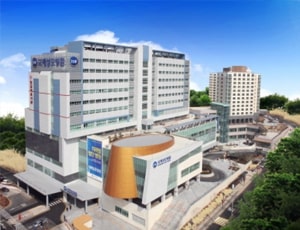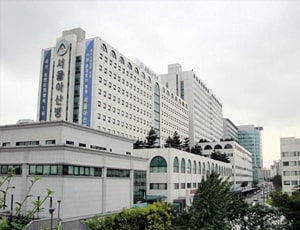Treatment cost

International St. Mary's Hospital located in Seoul, South Korea is accredited by JCI. Also listed below are some of the most prominent infrastructural details:


Asan Medical Centre located in Seoul, South Korea is accredited by ISO. Also listed below are some of the most prominent infrastructural details:
Atrial Septal Defect is a congenital heart defect in which there is a hole in the wall (septum) between the upper chambers of the heart (atria). This hole allows blood to flow between the atria, which leads to increased blood flow to the lungs. While small ASDs may not cause any significant concerns, whereas larger ones may require medical attention, such as surgical repair, to prevent complications.
The main reason for atrial septal defects remains elusive, manifesting as an alteration in the heart's structure during fetal development. The intricate process of the baby's heart formation is an essential stage for the emergence of this condition.
ASDs may arise due to the following factors, including
Atrial septal defects (ASDs) may be better understood by considering the normal functioning of the heart, which has four chambers – two atria and two ventricles. The right side of the heart directs blood to the lungs for oxygenation, while the left side pumps oxygenated blood throughout the body via the aorta. A significant ASD can lead to an excess flow of blood to the lungs, straining the right side of the heart. If left untreated, this can result in the enlargement and weakening of the right heart chamber and an elevation in pulmonary artery pressure, Causing pulmonary hypertension.
There are different types of ASDs classified based on the Location and the size of the hole, these include:
Atrial septal defect (ASD) repair is used to close a hole in the septum, There are different methods for repairing ASD, and the choice of procedure depends on the size, the position of the defect, and the patient's general health the determining factors in choosing the appropriate treatment.
Here are the common ways of treatment:
Post-surgery, patients usually have a short hospital stay, with transcatheter closure requiring 1-2 days and open-heart surgery lasting 3-7 days, sometimes involving ICU transfer to continue monitoring. A comprehensive recovery plan involves regular follow-up appointments, dietary adjustments, wound care, and emotional support. Additionally, effective pain management, adherence to activity restrictions, and a gradual return to normal activities are crucial components of the recovery process.
Ask your healthcare adviser for the best multiple options and choose the one that meets your expectations
The Atrial Septal Defect (ASD) Repair package cost in Seoul varies from one hospital to another and may offer different benefits. The Atrial Septal Defect (ASD) Repair package cost usually includes all the expenses related to pre and post surgery expenses of the patient. The Atrial Septal Defect (ASD) Repair cost in Seoul includes the cost of anesthesia, medicines, hospitalization and the surgeon's fee. Stay outside the package duration, port-operative complications and diagnosis of a new condition may further increase the Atrial Septal Defect (ASD) Repair cost in Seoul.
There are many hospitals that perform Atrial Septal Defect (ASD) Repair in Seoul. The following are some of the most renowned hospitals for Atrial Septal Defect (ASD) Repair in Seoul:
After Atrial Septal Defect (ASD) Repair in Seoul, the patient is supposed to stay in guest house for another 15 days. This is important to ensure that the surgery was successful. During this time, control and follow-up tests take place to check for medical fitness.
Apart from the cost of Atrial Septal Defect (ASD) Repair, the patient is also required to pay additionally for daily meals and guest house accommodation. The per day extra expenses in Seoul per person are about 40 USD.
After Atrial Septal Defect (ASD) Repair surgery, the patient is supposed to stay for about 5 Days in the hospital for recovery and monitoring. This time frame is important for the patient to recover properly and feel comfortable after the surgery. With the help of several tests, it is determined that the patient is doing fine after the surgery and is okay to be discharged.
Out of all the hospitals in Seoul, there are about 2 Hospitals best hospitals for Atrial Septal Defect (ASD) Repair in Seoul. These hospitals have proper infrastructure for the treatment of patients who require Atrial Septal Defect (ASD) Repair. Apart from good services, the hospitals are known to follow all standard and legal guidelines as dictated by the local medical affairs body or organization.
Some of the most sought after doctors for Atrial Septal Defect (ASD) Repair in Seoul are:
One of the most popular destinations for medical tourism in the world, Seoul, the capital of South Korea attracts around 60% of the patients traveling to the country for quality care. More than 2.76 million International patients travel to South Korea on average. This can be attributed to high-quality medical services, economical healthcare services, and affordable packages that combine both treatment and relaxation. The number of healthcare organizations in Seoul tally up to 21,507. Out of these, 14 are advanced hospitals that provide a range of healthcare services. The high success rate of cancer treatment, plastic surgery, and organ transplants attract the majority of foreign patients to Seoul. Hundreds and thousands of patients from abroad travel to Seoul for cosmetic and plastic surgery. The largest proportion of medical tourists belonged to China and the United States. The top hospitals in Seoul have well-trained medical staff along with coordinators that help international patients availing treatments without any issues.
Seoul has a wide network of internationally accredited hospitals that are using cutting-edge medical technology to treat patients. Some of the top hospitals in Seoul are:
The doctors in Seoul obtained their medical education and training from some of the most reputed medical institutions around the world. Some of the top doctors in Seoul are:
Seoul is a major healthcare center and is well connected to the major cities in the globe via air. You can reach the city by international flights. If you are planning to travel, then we can assist you in making the journey hassle-free.